
Charles Brown
blues
Support www.hipchristmas.com! ![]() Shop at
Amazon,
Apple Music, and more...
Shop at
Amazon,
Apple Music, and more...
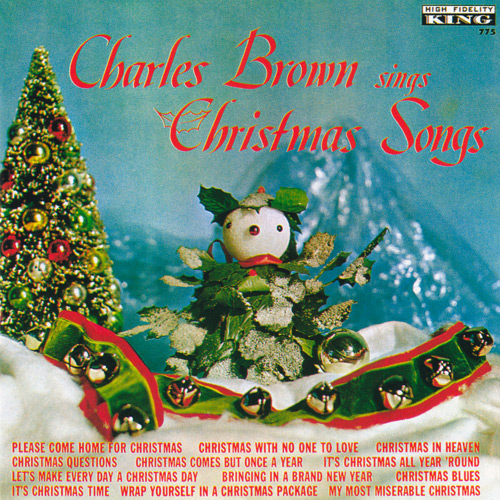 Charles
Brown (read more), whose ambling, relaxed, sophisticated blues are now but
a footnote to musical history, is the unofficial but undisputed king of hip Christmas
music. He earned his crown primarily on the basis of two songs, both of them languid, romantic ballads. First, there was "Merry Christmas, Baby," written by Johnny Moore and Lou Baxter (though Brown would later claim authorship), and recorded for Exclusive Records in 1947. Next came "Please
Come Home For Christmas," written by Brown and Gene Redd, and recorded for King Records in 1960. Subsequently, Charles Brown recorded these two songs many times, including roughly
a dozen versions of "Merry Christmas, Baby" for almost as many labels.
Charles
Brown (read more), whose ambling, relaxed, sophisticated blues are now but
a footnote to musical history, is the unofficial but undisputed king of hip Christmas
music. He earned his crown primarily on the basis of two songs, both of them languid, romantic ballads. First, there was "Merry Christmas, Baby," written by Johnny Moore and Lou Baxter (though Brown would later claim authorship), and recorded for Exclusive Records in 1947. Next came "Please
Come Home For Christmas," written by Brown and Gene Redd, and recorded for King Records in 1960. Subsequently, Charles Brown recorded these two songs many times, including roughly
a dozen versions of "Merry Christmas, Baby" for almost as many labels.
Over the years, the two songs became holiday standards, transcending genre and generating countless cover versions. Most famously, Otis Redding covered "Merry Christmas, Baby" on the classic Soul Christmas LP in 1968, with a radically different, uptempo arrangement that was later deployed by Bruce Springsteen, among others. Then, the Eagles took "Please Come Home For Christmas" to #18 on the pop charts in 1978 - an era when very few major acts recorded Christmas music at all.
Charles Brown's original version of "Merry Christmas Baby" was billed to Johnny Moore's Three Blazers. The song featured Moore's jazzy guitar on top of Brown's tinkling celesta and indolent, unflappable vocals. It peaked at #3 on the R&B charts and would go Top 10 the two following years. Johnny was the older brother of Oscar Moore, who made played guitar in the Nat King Cole trio, and he refused to let Brown - his star attraction - take top billing. This spurred Brown to go solo, and it is his languid 1956 recording for Aladdin Records that has proved the most enduring - and arguably best - rendition of "Merry Christmas Baby." It also charted, but only when reissued in the 60's by Imperial: #4 on the Christmas chart in 1964, and #10 in 1965.
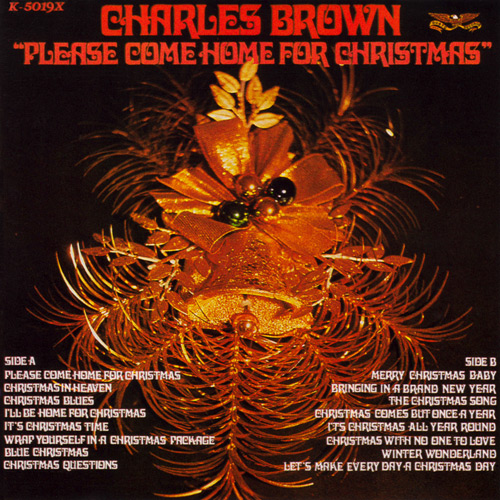 "Please Come For Christmas" reached #21 R&B in 1960, #76 Pop in 1961, and would go on to chart consistently for more than a decade. The label capitalized
on
that success by releasing Charles Brown's first holiday LP, Charles
Brown Sings Christmas Songs in 1961. The album is filled with the same seductive, melancholy, yet charming grooves
that made his two big holiday hits so great and that characterized his earlier hits like "Drifting Blues" (1946) and "Trouble Blues" (1949), and "Black Night" (1951). You'll find nary a standard on Sings Christmas Songs - no "Jingle Bells," "Frosty," or "Rudolph." Rather, the album is split between Brown's original songs and well-chosen covers from the King catalog. But, the album evokes the holiday with conviction, albeit in a thoroughly adult, completely secular manner. For reasons I can't entirely explain,
Charles Brown simply had an affinity for Christmas music; whether praising his
lover or lamenting his loneliness, every yule tune he crooned found him, in the
words of his signature song, "all lit up like a Christmas tree."
"Please Come For Christmas" reached #21 R&B in 1960, #76 Pop in 1961, and would go on to chart consistently for more than a decade. The label capitalized
on
that success by releasing Charles Brown's first holiday LP, Charles
Brown Sings Christmas Songs in 1961. The album is filled with the same seductive, melancholy, yet charming grooves
that made his two big holiday hits so great and that characterized his earlier hits like "Drifting Blues" (1946) and "Trouble Blues" (1949), and "Black Night" (1951). You'll find nary a standard on Sings Christmas Songs - no "Jingle Bells," "Frosty," or "Rudolph." Rather, the album is split between Brown's original songs and well-chosen covers from the King catalog. But, the album evokes the holiday with conviction, albeit in a thoroughly adult, completely secular manner. For reasons I can't entirely explain,
Charles Brown simply had an affinity for Christmas music; whether praising his
lover or lamenting his loneliness, every yule tune he crooned found him, in the
words of his signature song, "all lit up like a Christmas tree."
The first pressings of Charles Brown Sings Christmas Songs were mono, and they included a delightfully downcast song called "My Most Miserable Christmas." Over they years, King would reissue the album many times, first replacing "My Most Miserable Christmas" with the 1947 version of "Merry Christmas Baby" (for obvious marketing reasons), and later putting the whole thing out in stereo with a lightly redesigned cover. They also eventually issued all of the tracks as singles, and it's also true that Brown would record an entirely new version of "Merry Christmas Baby" for the label. According to Collectables Records' The Very Best Of Charles Brown (2004), this new version was recorded in 1968. It was issued as a single that year, and that also could very well be when the stereo edition of the album was issued. But, it's simply hard to say exactly when all these things happened, in part because all of the vinyl reissues of Sings Christmas Songs during the 1960's had the same catalog number (King 775, if you're curious). Moreover, the history of the King label is murky at best, and its legacy has been shabbily maintained (read more).
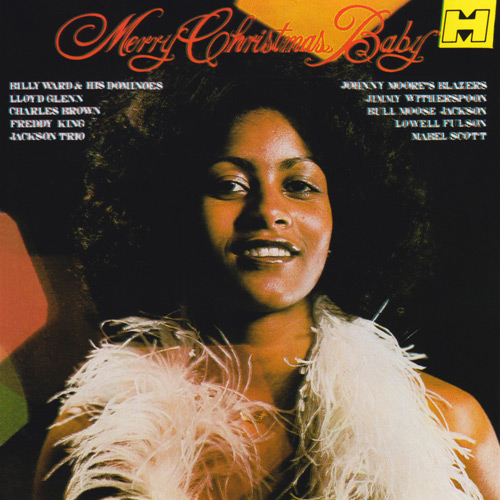 Speaking of which, in
1972, Gusto Records (which by then owned the King masters) overhauled Charles
Brown Sings Christmas Songs as Please
Come Home For Christmas, replacing the odd little snowman
cover with a similarly odd portrait of an ornament. Note, that Charles Brown's black face appears nowhere
on
either version - a common, racist practice in 1961, even more inexcusable over a decade later. Further, without explanation
King appended four rather nondescript instrumentals by organist Bill Doggett from
his 1958 LP, Songs
Of Christmas, considered by some
to be the first-ever rhythm & blues Christmas album.
Speaking of which, in
1972, Gusto Records (which by then owned the King masters) overhauled Charles
Brown Sings Christmas Songs as Please
Come Home For Christmas, replacing the odd little snowman
cover with a similarly odd portrait of an ornament. Note, that Charles Brown's black face appears nowhere
on
either version - a common, racist practice in 1961, even more inexcusable over a decade later. Further, without explanation
King appended four rather nondescript instrumentals by organist Bill Doggett from
his 1958 LP, Songs
Of Christmas, considered by some
to be the first-ever rhythm & blues Christmas album.
In 1978, Gusto also overhauled a Hollywood Records compilation called Merry Christmas Baby, featuring Charles Brown's original 1947 version of the song with Johnny Moore's Three Blazers, along with several later holiday tracks by the Blazers sans Brown. The album is jammed with wonderful R&B by Billy Ward, Freddie King, Lowell Fulson, Bull Moose Jackson, Jimmy Witherspoon, and others, though the packaging and mastering are abysmal (read more).
Regardless, Please Come Home For Christmas is the version of Charles Brown Sings Christmas Songs most likely to be found in your local record store, though King reissued both editions on compact disc in 1988 - albeit in typically shoddy fashion. Significantly, all the CD reissues have been in mono. For the record, the Sings Christmas Songs CD uses the 1947 version of "Merry Christmas Baby" whereas Please Come Home For Christmas is one of the few compact discs to include the later 60's version. Neither of them, by the way, include "My Most Miserable Christmas," which would not show up on CD for decades to come.
[close]
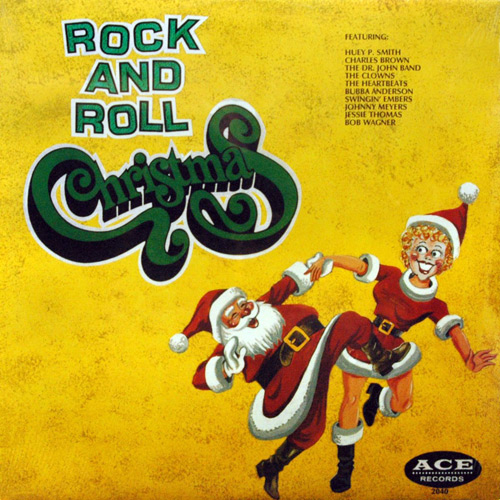 Anyway, as the 1960's wore on, Charles Brown's star faded, but he would wax many more holiday sides over the years. Sadly, his history and discography (especially his seasonal catalog) is inconsistently documented. I've spent many long hours trying to figure it all out, and I still can't pinpoint the precise details of a number of his Christmas records. All the same, here's what I know:
Anyway, as the 1960's wore on, Charles Brown's star faded, but he would wax many more holiday sides over the years. Sadly, his history and discography (especially his seasonal catalog) is inconsistently documented. I've spent many long hours trying to figure it all out, and I still can't pinpoint the precise details of a number of his Christmas records. All the same, here's what I know:
- Brown recorded for Ace Records in Mississippi during 1959 and 1960, and during that period he recorded the wonderful "Christmas Finds Me Oh So Sad" and another version of "Merry Christmas Baby," but with significantly updated lyrics. These tracks weren't released however, until 1963 when Ace put them out on their short-lived Teem imprint. You can find both sides on Westside's Blue Over You: The Ace Recordings or Ace's Rock and Roll Christmas. It's worth noting that "Christmas Finds Me Oh So Sad" is sometimes referred to as "Please Come Home For Christmas No. 2" and the songs do, indeed, sound quite similar.
- He recorded another version of "Merry Christmas Baby" for Kent Records in 1968, who issued it as a single backed with "3 O'Clock Blues." It can be found on Even Santa Gets The Blues (Poinblank, 1995) and The Best Christmas Ever (Virgin, 1996) - read more about both albums.
- Brown recorded yet another version of "Merry Christmas Baby" in 1969 for Bluesway Records, a subsidiary of ABC, under the title "New Merry Christmas Baby." It was first issued as a single backed with "Rainy Rainy Day" in late 1969, then included on his album Legend! in early 1970.
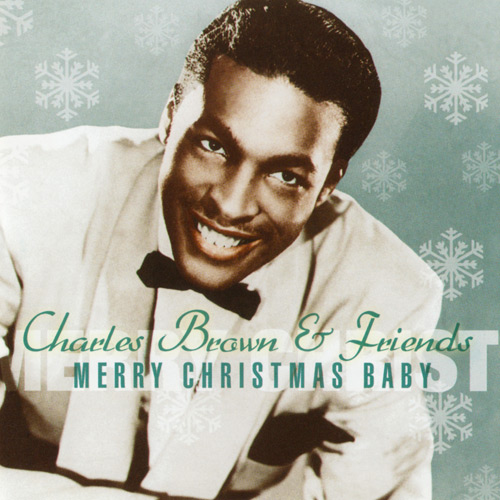 And then, Brown recorded several tracks for Jewel Records in 1970. They were initially issued as two singles: "Christmas In Heaven" backed with "Just A Blessing," and "Merry Christmas Baby" with "Please Come Home For Christmas" on the flipside. This particular version of "Merry Christmas Baby," replete with wah-wah guitar, is one of his best. In 1974, Jewel compiled these songs on an LP called Merry Christmas Baby, and later they were compiled on CD by Jewel's sister labels Paula (1991) and Ronn (1996). The latter set was soon reissued by budget label Fuel 2000, and that's the easiest version to find (read more). (A lot of people think the Jewel sides were released in 1965. This is wrong. Jewel had a bad habit of including the copyright date of their trademark on their labels, and there are also pressings stamped with the date 1974.)
And then, Brown recorded several tracks for Jewel Records in 1970. They were initially issued as two singles: "Christmas In Heaven" backed with "Just A Blessing," and "Merry Christmas Baby" with "Please Come Home For Christmas" on the flipside. This particular version of "Merry Christmas Baby," replete with wah-wah guitar, is one of his best. In 1974, Jewel compiled these songs on an LP called Merry Christmas Baby, and later they were compiled on CD by Jewel's sister labels Paula (1991) and Ronn (1996). The latter set was soon reissued by budget label Fuel 2000, and that's the easiest version to find (read more). (A lot of people think the Jewel sides were released in 1965. This is wrong. Jewel had a bad habit of including the copyright date of their trademark on their labels, and there are also pressings stamped with the date 1974.)- Around 1974, Brown recorded an album with renowned producer Johnny Otis for his label Blues Spectrum. It was the second volume of a 13-volume series called Great Rhythm & Blues Oldies, where each volume featured a different R&B legend performing new versions of his classic hits. Of course, Brown's sessions reprised "Merry Christmas Baby," which was also issued as a single backed with "Rockin' Blues." This version, featuring guitar by Otis' son, Shuggie, can be found on The Very Best Of Charles Brown (Stardust Records, 2000), which was essentially a reissue of the "Great Oldies" album. The Blues Spectrum version is also included on Cleopatra's Blues Christmas (2015).
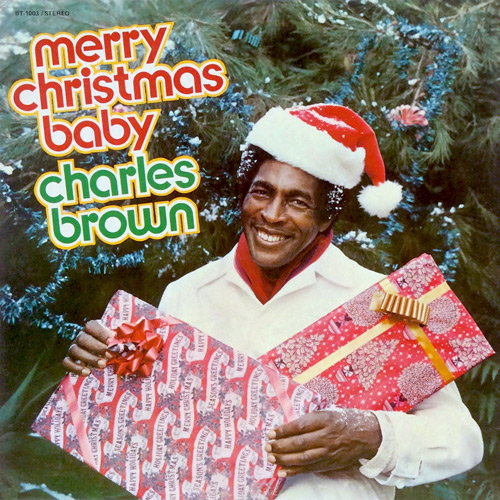 In 1977, Charles Brown recorded a little-known second holiday LP called Merry Christmas Baby for Big Town Records, a Los Angeles indie label owned by Jules Bihari, one of four brothers who had founded legendary Modern Records in 1945. It's an unusual album, frankly, that can be characterized several ways. First, it features nothing but original Charles Brown songs, all of them new except the famous title track. Second, it's even more downcast than normal, with many of the songs in a minor key at a slow tempo, most lamenting the loss of love, fortune, or friendship. Third, it's filled with odd, squiggly guitar and synthesizer sounds that date it horribly while, conversely, making it sound quite unique. Criminally, the Big Town LP has never been reissued in any digital format. However, one of its tracks, "I'll Be Home For Christmas" (an original song, not the holiday standard), popped up on the aforementioned Very Best Of Charles Brown and can be found on the occasional digital album.
In 1977, Charles Brown recorded a little-known second holiday LP called Merry Christmas Baby for Big Town Records, a Los Angeles indie label owned by Jules Bihari, one of four brothers who had founded legendary Modern Records in 1945. It's an unusual album, frankly, that can be characterized several ways. First, it features nothing but original Charles Brown songs, all of them new except the famous title track. Second, it's even more downcast than normal, with many of the songs in a minor key at a slow tempo, most lamenting the loss of love, fortune, or friendship. Third, it's filled with odd, squiggly guitar and synthesizer sounds that date it horribly while, conversely, making it sound quite unique. Criminally, the Big Town LP has never been reissued in any digital format. However, one of its tracks, "I'll Be Home For Christmas" (an original song, not the holiday standard), popped up on the aforementioned Very Best Of Charles Brown and can be found on the occasional digital album.- Rounder Records released 1990 live recordings of "Merry Christmas Baby" and "Please Come Home For Christmas" on A Life In The Blues (2003). The show was recorded at the Lone Star Roadhouse in Dallas.
- Finally, late in his career Charles Brown released a handful of one-off tracks.
- He recorded Mabel Scott's classic "Boogie Woogie Santa Claus" for The Alligator Records Christmas Collection (1992). Well, sort of. It's basically a different song. Regardless, Brown was Scott's pianist when she recorded the song in 1948, and she married him the following year - though they divorced three years later.
- He waxed a lovely duet version of "Merry Christmas Baby" with Bonnie Raitt for A Very Special Christmas 2 (1992).
- He recorded a solo medley of his two biggest holiday hits for Bullseye Blues Christmas (1995), accompanying himself on the organ. It's a touching performance that would prove to be his final Christmas recording.
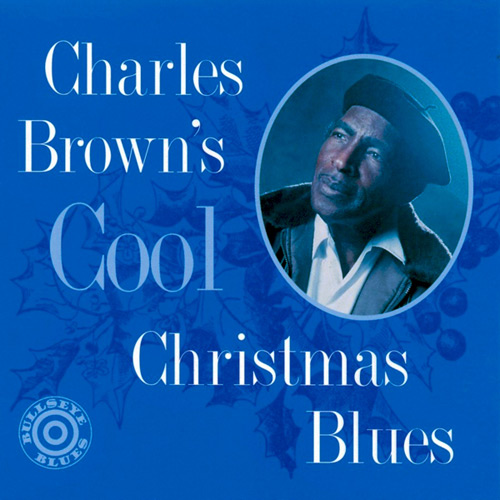 Charles Brown died in 1999 at age 76 having never achieved widespread fame. That said, he was a major star on the
post-war blues scene and an important influence on an entire generation of singers, Ray Charles
foremost among them. Happily, in his latter days, Charles Brown experienced something of
a renaissance, recording for Bullseye and Verve, singing with Boz Scaggs and John Lee Hooker, and earning
some long overdue recognition for his myriad accomplishments. During this period, Brown released
a third and final seasonal album, Cool
Christmas Blues (Bullseye, 1994), which included a 1993 single, "A Song For Christmas."
Charles Brown died in 1999 at age 76 having never achieved widespread fame. That said, he was a major star on the
post-war blues scene and an important influence on an entire generation of singers, Ray Charles
foremost among them. Happily, in his latter days, Charles Brown experienced something of
a renaissance, recording for Bullseye and Verve, singing with Boz Scaggs and John Lee Hooker, and earning
some long overdue recognition for his myriad accomplishments. During this period, Brown released
a third and final seasonal album, Cool
Christmas Blues (Bullseye, 1994), which included a 1993 single, "A Song For Christmas."
I recommended Cool Christmas Blues, though it's admittedly less essential than Brown's early recordings. The album is split about evenly between old favorites - including, of course, new versions of Brown's two preeminent holiday hits - and numerous titles completely new to Brown's repertoire. Most notably, that includes several brand new Charles Brown compositions. One of them, "Stay With Me," simply isn't a Christmas song. The other two are, though: a romantic holiday ballad, "To Someone That I Love," and a rollicking rocker, "Santa's Blues," featuring the saxophone of Bobby Forte. Guess which one I like more?
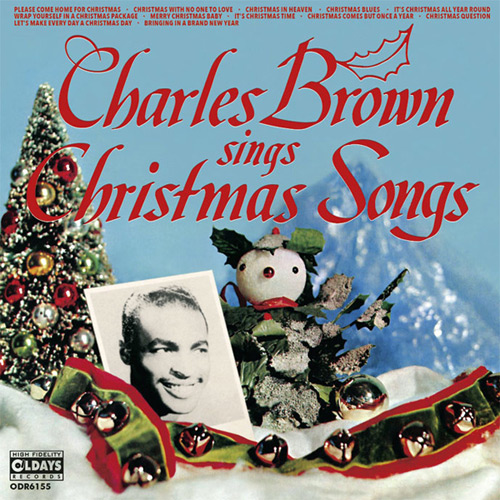 The other highlights are two songs Brown waxed for Sings Christmas Songs way back in 1961, "Bringing In A Brand New Year" (first recorded as "Ringing In A Brand New Year" by Billy Ward & The Dominoes in 1953) and Amos Milburn's "Christmas (Comes But Once A Year)." Milburn's original version of the song was actually the flipside of Brown's 1960 King single, "Please Come Home For Christmas." His 1961 recordings are fine, but on Cool
Christmas Blues Brown and his band - including Johnny Otis on vibes - really stretch out and swing. Altogether, the album puts a fine point on Charles Brown's legacy, both as a musician and as a holiday icon.
The other highlights are two songs Brown waxed for Sings Christmas Songs way back in 1961, "Bringing In A Brand New Year" (first recorded as "Ringing In A Brand New Year" by Billy Ward & The Dominoes in 1953) and Amos Milburn's "Christmas (Comes But Once A Year)." Milburn's original version of the song was actually the flipside of Brown's 1960 King single, "Please Come Home For Christmas." His 1961 recordings are fine, but on Cool
Christmas Blues Brown and his band - including Johnny Otis on vibes - really stretch out and swing. Altogether, the album puts a fine point on Charles Brown's legacy, both as a musician and as a holiday icon.
Postscript
In 2015, a Japanese label called Oldays reissued Charles Brown Sings Christmas Songs. The mastering was improved, though not dramatically so, and the mini-LP packaging is nice (though almost everything is written in Japanese). The label even figured out a way to shoehorn Brown's picture into the original cover illustration! Oldays also restored the original 1961 track listing - meaning "My Most Miserable Christmas" finally appeared on a CD - and added two bonus tracks, an alternate take of "Christmas Finds Me Oh So Sad" and, weirdly, the Aladdin version of "Merry Christmas Baby," not one of the King masters. Also, it's in mono, which is disappointing, and it's a public domain release (copyright expires in Japan after 50 years). All the same, it's the best reissue of the album ever, though it might be hard to track down outside of Japan. Try eBay, CD Japan, or directly from the label. [top of page]
 Albums
Albums
- Charles Brown Sings Christmas Songs (1961) Top 20 Album
- Merry Christmas Baby (1977)
- Please Come Home For Christmas (1978)
- Cool Christmas Blues (1994)
 Essential Songs
Essential Songs
- Bringing In A Brand New Year (1994)
- Christmas Blues (1961)
- Christmas (Comes But Once A Year) (1994)
- Christmas Finds Me Oh So Sad (1960)
- Christmas With No One To Love (1961)
- I'll Be Home For Christmas (1977)
- It's Christmas All Year 'Round (1961)
- Merry Christmas Baby (with Johnny Moore's Three Blazers, 1947)
- Merry Christmas Baby (1956) Top 100 Song
- Merry Christmas Baby (1970)
- Merry Christmas Baby (with Bonnie Raitt, 1992)
- My Most Miserable Christmas (1961)
- No Friend This Christmas (1977)
- Peace For Christmas (1977)
- Please Come Home For Christmas (1960) Top 100 Song
- Santa's Blues (1994)
- Wrap Yourself In A Christmas Package (1961)
- You Make Christmas Merry For Me (1977)
 Further Listening
Further Listening
- Blue Yule: Christmas Blues And R&B Classics (various artists, 1991)
- Christmas Blues: Savoy Jazz Christmas Album (various artists, 1994)
- Christmas Classics (various artists, 1988)
- Even Santa Gets The Blues (various artists, 1995)
- Legends Of Christmas Past: A Rock 'n' R&B Holiday Collection (various artists, 1992)
- Merry Christmas Baby (various artists, 1974)
- Merry Christmas Baby (Intimate Christmas Music For Lovers) (various artists, 1956)
- Merry Christmas Ho! Ho! Ho! (Lou Rawls, 1967)
- The Spirit Of Christmas (Ray Charles, 1985)
- Swing Time Christmas (various artists, 1995)



